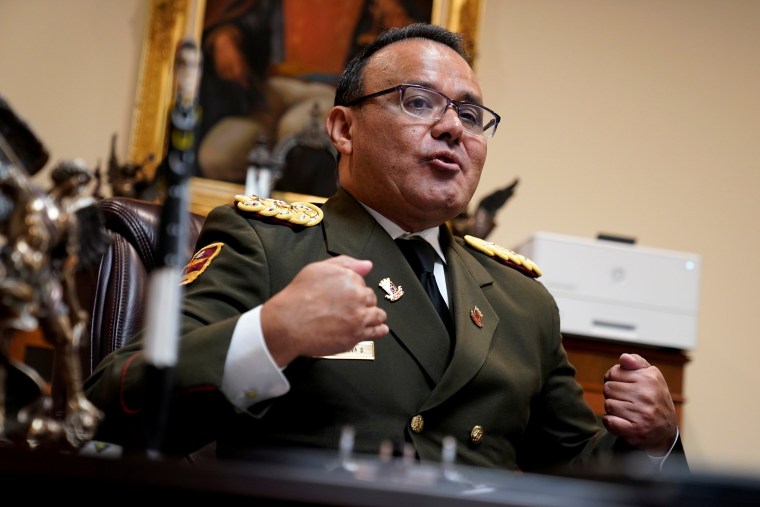CARACAS, Venezuela — Venezuela's embattled President Nicolás Maduro on Sunday rejected an international ultimatum to call elections within eight days and said opposition leader Juan Guaidó had violated the country's constitution by declaring himself leader.
Maduro, in an interview with CNN Turk, also said he was open to dialogue and that meeting President Donald Trump was improbable but not impossible. The broadcaster dubbed the interview from Spanish into Turkish.
Washington, which has recognized Guaidó as leader, had on Saturday urged the world to "pick a side" on Venezuela and financially disconnect from Maduro's socialist government.
Venezuela has sunk into turmoil under Maduro with food shortages and protests amid an economic and political crisis that has sparked mass emigration and inflation that is seen rising to 10 million percent this year.
Britain, Germany, France and Spain all said they would recognize Guaidó if Maduro failed to call fresh elections within eight days, an ultimatum Russia said was "absurd" and the Venezuelan foreign minister called "childlike."
Washington, Canada most Latin American nations and many European states have labeled Maduro's second-term election win last May fraudulent.
Maduro retains the loyalty of the armed forces, though Venezuela's top military envoy to the United States on Saturday defected to Guaidó.
"The armed forces have a fundamental role to play in the restoration of democracy," Col. José Luis Silva said in the video, which he said was shot at his office in the Venezuelan Embassy in Washington, sitting in front of the nation's red, blue and yellow flag.
He called on other members of the military to join him in supporting Guaidó, saying they need to avoid "attacking" protesters whose only aim is to feed themselves.

Garrett Marquis, a spokesman for U.S. National Security Council, encouraged others to follow Silva's lead "to protect constitutional order, not to sustain dictators and repress its own people."
Venezuela's top commanders have pledged loyalty to Maduro's government in the days since Guaidó declared himself interim leader. But support for Maduro's rule is weaker among the military's rank and file, whose households are suffering from widespread food shortages and hyperinflation like their civilian counterparts.
The standoff has plunged troubled Venezuela into a new chapter of political turmoil that rights groups say has already left more than two dozen dead as thousands take to the street demanding Maduro step down.
Venezuela defused a potential showdown with the U.S. late Saturday, suspending a demand that U.S. diplomats leave the country.
Maduro broke relations with the U.S. on Wednesday after the Trump administration recognized Guaidó as interim president, a move that Maduro called a coup attempt.
Maduro gave U.S. diplomats three days to leave the country, but the Trump administration said it wouldn't obey, arguing that Maduro is no longer Venezuela's legitimate president. That set the stage for a showdown at the hilltop U.S. Embassy compound Saturday night, when the deadline was to expire.
But as the sun set on Venezuela's capital, the Foreign Ministry issued a statement saying Maduro's government was suspending the expulsion to provide a 30-day window for negotiating with U.S. officials about setting up a "U.S. interests office" in Venezuela and a similar Venezuelan office in the United States.
The U.S. and Cuba had a similar arrangement for decades before the Obama administration restored diplomatic relations with the communist-run island.
The State Department did not confirm the Venezuelan government's account, reiterating only that its priority remains the safety of its personnel and that it has no plans to close the embassy.
Earlier Saturday, Secretary of State Mike Pompeo told the U.N. Security Council: "Let me be 100 percent clear — President Trump and I fully expect that our diplomats will continue to receive protections provided under the Vienna Convention. Do not test the United States on our resolve to protect our people."
In the Security Council meeting, critics and supporters of Maduro's government faced off in a reflection of the world's deep divisions over Venezuela, which is mired in political confrontation as well as an economic collapse that has caused millions to flee the country.
During the debate, which was requested by the U.S., Pompeo urged all nations to end Venezuela's "nightmare" and support Guaidó.
"Now is the time for every other national to pick a side," Pompeo said. "No more delays, no more games. Either you stand with the forces of freedom, or you're in league with Maduro and his mayhem."
Russian Ambassador Vassily Nebenzia charged that the Trump administration is trying "to engineer a coup" against Maduro.
Nebenzia urged Pompeo to say whether the U.S. will use military force.
Pompeo later told reporters who asked for a response, "I am not going to speculate or hypothesize on what the U.S. will do next."
Pompeo was accompanied to New York by Elliott Abrams, who was named a day earlier as the U.S. special representative for Venezuela. Abrams is a former assistant secretary of state for Latin America who worked at the White House when a 2002 coup in Venezuela briefly ousted Maduro's predecessor, the late Hugo Chávez.

